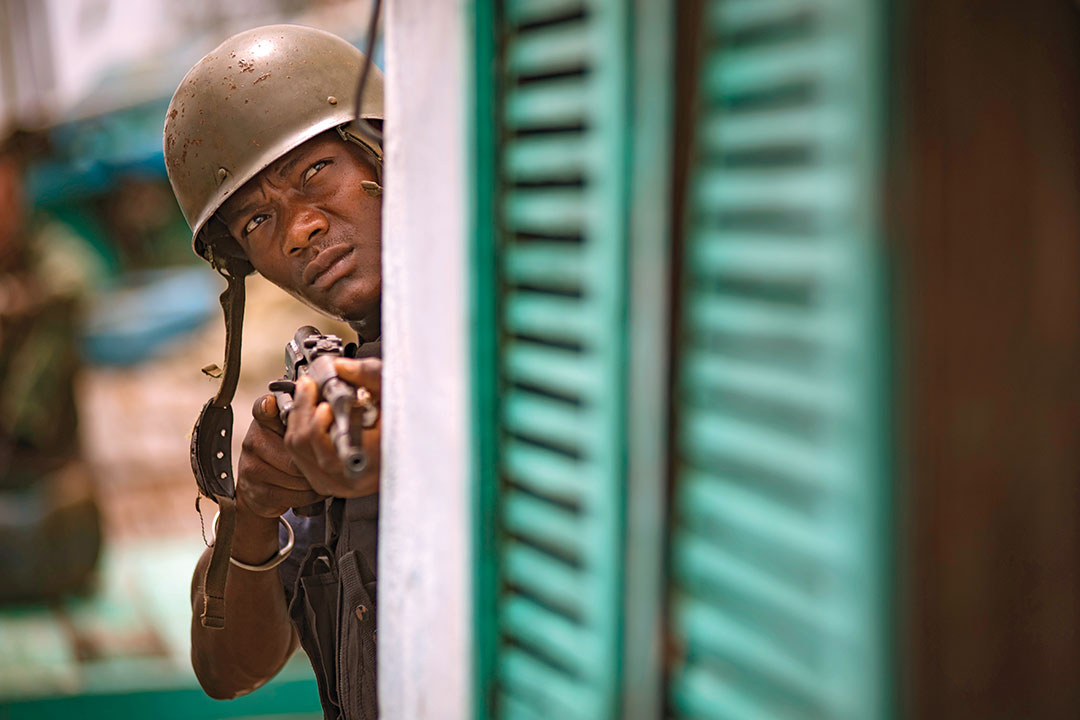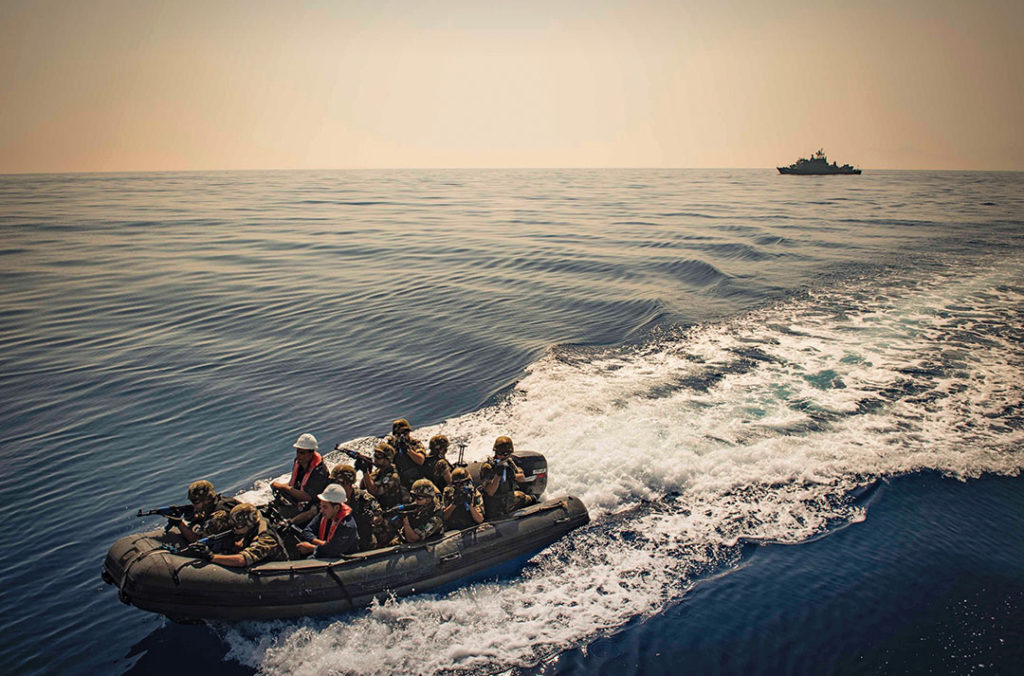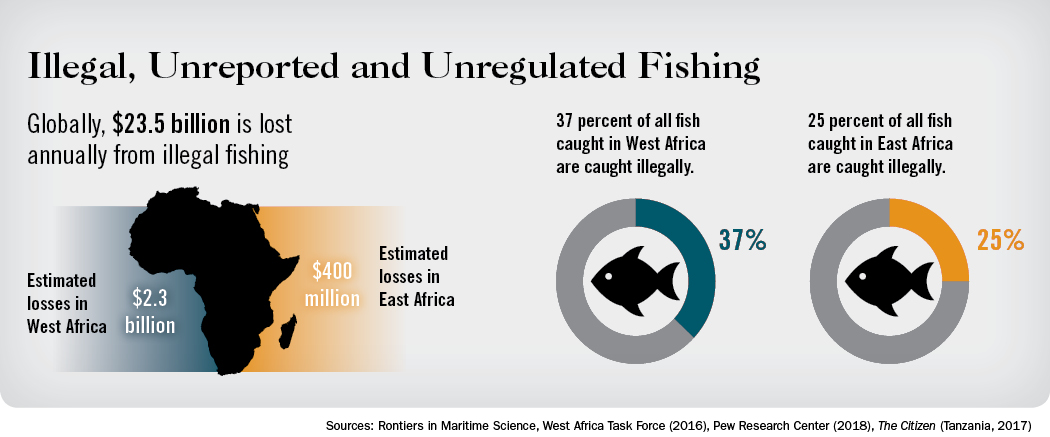Piracy Remains a Problem, but African Nations Are Working Together
ADF Staff
With more than 30,000 kilometers of coastline, the fortunes of the African continent are inextricably bound to safety and security at sea.
From Senegal to Angola, nations are working to deter pirates and thieves who ply the waters of the Gulf of Guinea for oil, fish and ransoms. In the Red Sea, Gulf of Aden and the Indian Ocean — all the way down to the Mozambique Channel — nations and international forces combat Somali pirates, who have staged something of a resurgence recently.
Seventy percent of Africa’s nations — 38 out of 54 — border the sea and depend on it for travel, trade and livelihoods.

PETTY OFFICER 3RD CLASS FORD WILLIAMS/U.S. NAVY
In short, a secure maritime domain is a vital part of national stability. A vibrant economy depends on a stable nation, and vice versa. Lt. Cmdr. Ghislain M. Moussavou of the Gabonese Navy said in advance of exercise Obangame Express 2018 that “if you have a maritime area that is not safe and secure, there is a negative impact on the livelihood of local communities, and then that can destabilize the country.”
Piracy is as old as seagoing itself, but the scourge has been a constant African security problem for close to two decades now, first in East Africa and later off the coast of West Africa.
Codes of Conduct
East and West African regions each have codes of conduct that set standards of cooperation among nations in the fight against piracy and other maritime crimes. East Africa’s Djibouti Code of Conduct came first in 2009, enacted by the International Maritime Organization (IMO). The IMO told ADF in 2012 that the code was intended to promote information sharing, regional training, national legislation and capacity building.
Now, after years of success, the IMO says the code has been amended to cover illicit maritime activity beyond piracy and armed robbery, such as arms, drugs, human and wildlife trafficking; illegal waste dumping; illegal fishing; and crude oil theft. This happened in 2017 during a meeting in Jeddah, Saudi Arabia. The result is the Jeddah Amendment to the Djibouti Code of Conduct 2017.
West and Central African nations in 2013 signed the Yaoundé Code of Conduct in Cameroon, which similarly commits them to cooperate on maritime security by sharing and reporting information, interdicting vessels suspected of illegal activities, apprehending and prosecuting criminals, and caring for and repatriating seafarers subjected to illegal activity.
Exercises Solidify Cooperation
African nations and their international partners come together in each coastal region to practice and perfect the goals and mandates laid out in the codes of conduct. U.S. Africa Command sponsors three regional “Express” series exercises off African coasts to test and improve the capacities of African and international partner nations and organizations.
In East Africa, the Seychelles hosted Cutlass Express 2018, which used the Jeddah Amendment to the Djibouti Code of Conduct as a framework for conducting information-sharing drills and other exercises. Participating nations were Australia, Canada, Comoros, Denmark, Djibouti, France, Kenya, Madagascar, Mauritius, Mozambique, the Netherlands, New Zealand, Seychelles, Somalia, South Africa, Turkey and the United States.
In West Africa, Gabon hosted Obangame Express 2018, the eighth iteration of a naval exercise that plays out all along the West African coast, including the crucial Gulf of Guinea region. Nations participate in boarding and search-and-seizure drills at sea, and land bases work on communications and information sharing. The exercise is intended to help African nations counter all types of illicit trafficking, illegal migration, piracy and illegal fishing. The 2018 iteration of the event included maritime operation centers in five areas and covered 2.36 million square kilometers.
Participating were Angola, Belgium, Benin, Brazil, Cape Verde, Cameroon, Canada, Côte d’Ivoire, the Democratic Republic of the Congo, Denmark, France, Gabon, Germany, Ghana, Guinea, Guinea-Bissau, Liberia, Morocco, Namibia, the Netherlands, Nigeria, Portugal, the Republic of the Congo, São Tomé and Príncipe, Senegal, Sierra Leone, Spain, The Gambia, Togo, Turkey and the United States, as well as the Economic Community of West African States and the Economic Community of Central African States.
Although East and West Africa are best known for piracy and maritime crime, the coast of North Africa has its own set of maritime issues. Phoenix Express 2018 helped improve regional cooperation, increase maritime domain awareness, information-sharing, and operations to promote safety and security in the Mediterranean Sea.
Phoenix Express, which began in 2005, was headquartered in Souda Bay, Greece, but included operations throughout the Mediterranean Sea, including territorial waters of North African nations. The exercise tested the ability of European, North African and U.S. forces to respond to irregular migration and to combat illicit trafficking and the movement of illegal materials.
Participating were Algeria, Canada, Denmark, Greece, Italy, Libya, Malta, Mauritania, Morocco, the Netherlands, Spain, Tunisia, Turkey and the United States.
Success Stories
Piracy and other maritime crimes endanger lives, livelihoods and national security. The connection between land- and sea-based crime is well-established, and African nations on all coasts will have to continue to be vigilant in building their individual capacities while cooperating with each other. Even so, progress is being made across the continent.
Dr. Ian Ralby, adjunct professor of maritime law and security at the Africa Center for Strategic Studies, said because of the attention paid to piracy in recent years, a lot of countries have “turned to face the sea” more directly to address maritime concerns. This was clear during the Whole of Africa Maritime Dialogue in Victoria, Seychelles, which focused on enhancing African maritime security.
The weeklong event in March 2018 had nearly 50 people from 26 countries and 13 regional organizations meet to discuss an array of topics, including cooperative responses to maritime issues, developing a maritime strategy, technological surveillance, developing a “blue economy” and prosecuting sea-based crimes.
Participants visited the Seychelles’ piracy court and appeals chamber. They also boarded and inspected an Iranian dhow captured during a drug-trafficking case. The boat now is used as a training tool. “A pier-side talk about the dhow and how the drugs were hidden helped participants grasp, first-hand, the operational challenges facing the region,” according to a program summary of the dialogue. “In boarding the vessel, participants could see what searching such a ship would require.”
Ralby said he hopes the dialogue will become an annual fixture on the continent. The next one is likely to be in February 2019. There should be many ideas and viewpoints to share, as Ralby said progress is being made across the continent:
- Morocco and Algeria are cooperating, despite their differences.
- The Seychelles, Africa’s smallest nation, is leading the way on piracy prosecutions and harnessing its maritime domain to secure economic wealth.
- Cameroon, Equatorial Guinea, Gabon and São Tomé and Príncipe can successfully undertake combined operations at sea every day of the year. Their information sharing through the Economic Community of Central African States’ Zone D, one of five such zones in West Africa, is a model for others.
- Senegal has been successful at fighting illegal fishing.
- Ghana’s Navy works and shares with neighboring countries.
- São Tomé and Príncipe are working to replicate the Seychelles’ fish traceability policies. The nation also in February 2018 published an integrated maritime strategy, and Sierra Leone was close to doing the same. Côte d’Ivoire published its maritime strategy in 2014.
“There’s something to celebrate pretty much everywhere,” Ralby said.


